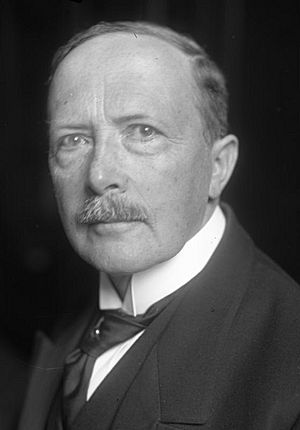Walter Simons facts for kids
Quick facts for kids
Walter Simons
|
|
|---|---|

Walter Simons in 1931
|
|
| Minister for Foreign Affairs | |
| In office 25 June 1920 – 4 May 1921 |
|
| President | Friedrich Ebert |
| Chancellor | Constantin Fehrenbach |
| Preceded by | Adolf Köster |
| Succeeded by | Friedrich Rosen |
| President of the Reichsgericht | |
| In office 16 October 1922 – 1 April 1929 |
|
| Preceded by | Heinrich Delbrück |
| Succeeded by | Erwin Bumke |
| Personal details | |
| Born | 24 September 1861 Elberfeld, Kingdom of Prussia |
| Died | 14 July 1937 (aged 75) Potsdam, German Reich |
| Resting place | Wilmersdorfer Waldfriedhof |
| Spouse |
Erna Rühle
(m. 1890) |
| Children | 7 |
| Relatives | Gerhard Simons (grandson) |
| Profession | Lawyer |
| Signature | |
Walter Simons (born September 24, 1861 – died July 14, 1937) was a German lawyer and politician. He served as the Foreign Minister for Germany from 1920 to 1921. This was during the time of the Weimar Republic, which was Germany's government after World War I. Later, he became the president of the Reichsgericht, which was Germany's highest court, from 1922 to 1929.
Contents
Early Life and Education
Walter Simons was born in a town called Elberfeld, which is now part of Wuppertal, Germany. His family had a special history; they were Huguenots, a group of French Protestants who moved to Germany a long time ago. His father, Ludwig Simons, was a silk manufacturer.
Walter went to a good school in Elberfeld and finished in 1879. After that, he studied law, economics, and history at universities in Strasbourg, Leipzig, and Bonn. A professor named Rudolph Sohm greatly influenced his studies. Walter became a judge's assistant in Bonn and Solingen. In 1890, he married Erna Rühle, and they had seven children together.
Working for the Government
Walter Simons began his career as a judge in 1893. He worked in different courts, including one in Thuringia. In 1905, he moved to Berlin to work at the Reichsjustizamt, which was like the German Ministry of Justice.
In 1907, he started working on international law. This meant he represented Germany at important meetings with other countries. In 1911, he moved to the Auswärtige Amt, which is Germany's Foreign Office. He became a legal expert there.
Helping with Peace Talks
In 1918, Walter Simons was part of the German team that negotiated the Treaty of Brest-Litovsk. This treaty ended Russia's involvement in World War I. He also helped with changes to the German constitution, which gave more power to the German parliament, the Reichstag.
After World War I, in 1919, Simons was a key member of the German group at the Treaty of Versailles talks. This treaty officially ended the war. However, he disagreed with signing the treaty, so he left his government job. He then worked for a group of German industrialists.
Political Roles and Influence
Walter Simons never joined a specific political party. However, he served as Germany's Foreign Minister from June 1920 to May 1921. During this time, he represented Germany at important international meetings, like the Spa Conference and a conference in London.
In 1922, he helped start a discussion group called the SeSiSo-Kreis in Berlin. This group brought together important people to talk about politics and society.
Leading Germany's Highest Court
In 1922, Walter Simons became the president of the Reichsgericht in Leipzig. This was the highest court in Germany.
Acting Head of State
When Germany's president, Friedrich Ebert, passed away in 1925, Walter Simons temporarily became the acting head of state. He held this important role until a new president, Paul von Hindenburg, was sworn in. Simons himself was considered as a possible candidate for president, but he chose not to run.
As president of the Reichsgericht, Simons led different parts of the court. He also led the Staatsgerichtshof, which was a special court for issues involving the German states. He resigned from his position in 1929 after a disagreement with President Hindenburg.
Later Life and Activities
After leaving the court, Walter Simons became a professor of international law at the University of Leipzig. He was also very active in the Lutheran church. He was the first person who was not a religious leader to become president of the Evangelical Social Congress.
After the Nazis came to power in 1933, Simons mostly focused on his church work and on honoring the famous composer Johann Sebastian Bach. Some of his later writings showed some support for the Nazi government's foreign policies.
Walter Simons passed away on July 14, 1937, near Potsdam.
Awards
- 1931 Adlerschild des Deutschen Reiches (Eagle Shield of the German Reich) – This was a high honor given by the German government.
Selected Writings
- Christentum und Verbrechen (Christianity and Crime), 1925
- Religion und Recht (Religion and Law), 1936
- Kirchenvolk und Staatsvolk, 1937
Images for kids
See also
 In Spanish: Walter Simons para niños
In Spanish: Walter Simons para niños

